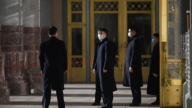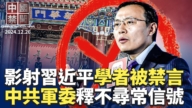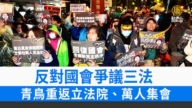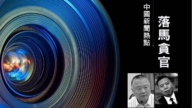【新唐人2013年03月04日讯】“两会”召开前夕,有英国媒体在网上公开了一个筹备1年多,有关中共权力高层的人事、组织、社会关系和派系关系的数据库,以网路页面的形式揭开了中共官场的种种关系纠葛。让我们一起来看看。
日前,英国《路透社》公布了一个名为“链接中国”的数据库(网路链接为connectedchina.reuters.com)。这个数据库采用了网络技术的新概念,以大量互动式的图表和链接,系统化的呈现出中共官场的真实面貌。
《路透社》宣称,数据库经过一年半左右的时间研发,包含成千上万个项目,收录的中共官场人物、组织和活动等,构成超过三万种关系网络。
香港《动向》杂志主编张伟国:“虽然过去二、三十年里面,陆陆续续已经有一些参与原来共产党政治运作的一些官员、秘书、研究人员出了一些介绍内幕的情况,但是由于各种各样的条件限制,所以整体上系统性的、全面的对这种问题的揭示还是一个空白。《路透社》这个东西出来,应该在这方面有抛砖引玉的作用。”
数据库收录的人物资料,包括从中共最高层核心,到市级地方官员,清晰展示了官场内谁和谁关系良好、官员获谁的提拔擢升、派系身份、家庭成员、亲属任职等情况。甚至连官员的秘书、曾经表扬过何人、社会关系等底细、状况,也加以整理并——呈现。
比如,对中共前政法委书记周永康的权力来源,数据库是这样描述的:江泽民在周永康的政治生涯中扮演了关键角色,两人也是重要的盟友。周永康由曾庆红推荐给江泽民,并在1999年镇压法轮功时取得了江的信任,成为江的“左右手”……
张伟国:“中共原来的那种愚民政策,要想继续用封闭的那种手段去垄断新闻资源,继续搞内幕的交易,变得代价越来越大。这也是中国政治机制与现代文明发展潮流相碰撞的结果。”
加拿大时事评论员刘淇昆认为,在正常的社会,媒体是“三权分立”之外的第四权力,但是中国大陆的媒体在中共的操控下,无法发挥这种作用。
加拿大时事评论员刘淇昆:“结果出现一个很耐人寻味也颇为可笑的情况,就是外国的媒体充当起中国的第四权力来了。他揭露中国官场的情况,他对中国的官场起到了某种监督作用。或者由于他的揭露,中国老百姓能够了解到官场的一些运作情况。”
刘淇昆还表示,《路透社》的数据库有助于外界进一步了解中共的政治黑幕,不过对于中共当前的权力结构不会有重大的影响。
刘淇昆:“即将召开的两会,我觉得并不是太重要,因为政协就不用说了,政协不过是个政治花瓶而已﹔就是人大,法律上说是国家最高权力机构,而谁都知道它不过是个橡皮图章,真正重大的人事任命,在十八大召开之前就解决了。”
数据库的发布也引来了网民的议论。有不少人称赞数据库的资料全面深入,可能成为新一轮反腐利器,揭发更多的中共贪官。目前,《新浪》微博已经将数据库名称列为敏感词,不予显示相关内容。
采访/常春 编辑/李明飞 后制/李智远
Reuters Database Exposes Intricate Relationships in CCP’s Bureaucracy
Just before the Chinese Communist Party(CCP)’s
two conferences,
Reuters has published a database on the CCP’s senior personnel,
organizations, social relationships and faction relationships.
It took more than a year to develop this database,
which has disclosed all kinds of intricate relationships in the CCP’s bureaucracy.
Recently Reuters has published a database “Connected China”.
This database systematically unveils the reality of
China’s bureaucracy behind appearances,
by utilizing new internet technologies,
like interactive charts and link.
Reuters claims that it took one and half years
to develop this database.
The whole developing process incorporated tens of
thousands of projects, like records of China officials, organizations and their activities.
The types of relationships among China’s officials
can be as many as 30,000.
Zhang Weigua, Chief Editor of Hong Kong’s “The Trend”:
“In the past 20 or so 30 years,
some insider news has been disclosed here and there
by CCP officials, secretaries and researchers.
However, due to all kinds of limitations, it’s not systematic,
neither was it complete.
Now Reuters has published “Connected China” and
it is a very good starting point.”
The materials incorporated in the database include
information about CCP senior core leadership as well as about municipal local officials.
It clearly illustrates who the officials have a good
relationship with, who promoted which officials, faction identity, family members and relatives.
The database even has a record of who was praised by
which official and the relationship between them.
For example, the description of how Zhou Yongkang
gained his power is:
Jiang Zemin played an important role in Zhou Yongkang’s
political career. They are important allies.
Zhou Yongkang was referred to Jiang Zemin by Zeng Qinghong.
Zhou Yongkang earned Jiang Zemin’s trust by
cracking down on Falun Gong practitioners in 1999,
and then became Jiang’s “left and right hand”.
Zhang Weiguo: “The means that the CCP has been using
to fool people are getting more and more pricey.
They have to pay more if they want to continue
blocking news sources and committing shady deals.
This is the impact of the collision between
China’s system and modern civilization.”
Liu Qikun, Commentator from Canada, stated that
media is the fourth power beyond “separation of the three powers” in a normal society.
Nevertheless, in China media is under the party’s control
and cannot play its true role.
Liu Qikun: “It’s both thought-provoking and ridiculous
that overseas media have become China’s ‘fourth power’.
Overseas media have disclosed some information
on China’s officials and played a supervision role.
In this way, ordinary people in China can learn a little bit
about how China’s bureaucracy works.”
Liu Qikun stated that Reuter’s database can help people
further understand the CCP’s shady deals.
However, it won’t have a big impact on the
CCP regime’s current structure.
Liu Qikun: “The approaching two conferences
are not that important at all.
The Political Consultative Conference is nothing
but a ‘political vase’.
The National Congress is said to be ‘the highest
power structure’ in China legislatively.
However, we all know it’s nothing but a political show.
All important personnel arrangements have been
determined before the 18th National Congress.”
The publication of Reuter’s database has caused a lot
of online discussion.
Many people think that the database
is both complete and in depth.
It can be the new weapon to be used in anti-corruption
and thus expose more corruptive officials.
Now “Sina” has already listed Reuters’ database
name as a “sensitive” word and you can’t find anything if you search for it online.






























